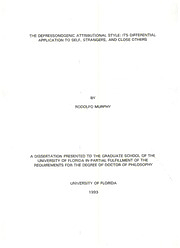Table Of ContentTHEDEPRESSONOGENICATTRIBUTIONALSTYLE: ITSDIFFERENTIAL
APPLICATIONTO SELF,STRANGERS, ANDCLOSEOTHERS
BY
RODOLFOMURPHY
ADISSERTATION PRESENTEDTOTHEGRADUATESCHOOLOFTHE
UNIVERSITYOFFLORIDAINPARTIALFULFILLMENTOFTHE
REQUIREMENTSFORTHEDEGREEOFDOCTOROFPHILOSOPHY
UNIVERSITYOFFLORIDA
ACKNOWLEDGMENTS
1wouldliketoexpressmyappreciationtoMonicaBiernatforthesupport
andencouragementshegavemeatthebeginningofmytenurehereat
Florida.Iwouldalsoliketothankmyresearchassistants, ReneDanielsand
CarrieSpringer,fortheirreliabilityandhardwork,themembersofmy
committee,andBarrySchlenkerforhisinputduringvariousstagesofthis
project.Finally,Iwouldliketothankmyfamily. Needlesstosay,without
theirsupportthisprojectcouldnothavebeencompleted.
II
TABLEOFCONTENTS
page
ACKNOWLEDGEMENTS jj
ABSTRACT .v
INTRODUCTION 1.
PessimismasaRiskFactorinDepression 1
TheValidityandReliabilityoftheAttributionalStyle 4
DotheAttributionsofDepressivesandNondepressivesDiffer? 6
TheUseofCausalCues 15
PessimismforSelfVersusOthers 20
SummaryandHypotheses 24
METHOD 27
Subjects 27
MaterialsandProcedure 27
RESULTS 32
PerceptionsofCovariation 32
Consensus 32
Distinctiveness 34
Consistency 36
RatingsoftheUsefulnessofCovariationInformation 38
Consensus 40
Distinctiveness 40
Consistency 40
InternalConsistencyoftheASQ 40
AttributionalBiases 41
ComparisonsBetweenSelfandOthers 43
EstimatesAbouttheFuture 46
RatingsofQualityofRelationships 48
QualityofRelationshipsandBiases 50
CausalCuesandAttributions 52
Note 62
DISCUSSION 63
SelfversusOther 67
TheUseofCausalCues 72
CONCLUSIONS 77
APPENDIXA
CES-DC 82
APPENDIXB
HYPOTHETICALEVENTSOFTHEASQ 83
APPENDIXC
RELATIONSHIPOUESTIONNAIRE .84
APPENDIXD
ATTRIBUTIONALSTYLEOUESTIONNAIRE 89
APPENDIXE
ESTIMATESOFOTHERS' SUCCESSESANDFAILURES 91
REFERENCES 92
BIOGRAPHICALSKETCH .100
IV
AbstractofDissertationPresentedtotheGraduateSchool
oftheUniversityofFloridainPartialFulfillment
oftheRequirementsfortheDegreeofDoctorofPhilosophy
THEDEPRESSONOGENICATTRIBUTIONALSTYLE: ITSDIFFERENTIAL
APPLICATIONTO SELF,STRANGERSANDCLOSEOTHERS
By
RodolfoMurphy
August, 1993
Chairman:BarryR. Schlenker,Ph.D.
MajorDepartment: Psychology
Thisstudyexamineddifferencesbetweendepressivesand
nondepressivesinthemanifestationofoptimisticbiasesforself,strangers
andcloseothers.SubjectscompletedamodifiedversionoftheAttributional
StyleOuestionnairewhichrequiresthemtoprovidecausalexplanationsfor
sixpositiveandsixnegativehypotheticalevents,andrateeachexplanation
alonginternality,stability, andglobalitydimensions. Inthismodifiedversion
subjectsalsoprovidedestimatesforthethreecovariationcriteriaidentified
byattributiontheory.Finally,subjectscompletedtheRelationshipQuality
Questionnaireusingparentorroommateastargetofevaluation.
Contrarytothecognitivemodelsofdepression,bothdepressivesand
nondepressivesexhibitedoptimisticbiases.Thesebiases, however,were
morepronouncedamongnondepressives.Depressivesexhibitedapositive
V
attributionalbiaswhenevaluatingtheself,closeothers,orstrangers.
Nondepressives,ontheotherhand,exhibitedapositiveattributionalbias
onlywhenevaluatingselforstrangers.
Nodifferenceswerefoundbetweendepressivesandnondepressivesin
theirratingsofthequalityoftheirrelationshipwithparentorroommate. In
addition,thepatternofcorrelationsbetweenestimatesofcovariationand
ratingsofattributionaldimensionsdidnotreplicatethosefoundbyprevious
research,andweregenerallyinconsistentwithattributiontheory.Also,these
correlationsvariedwithdifferenttargetsofevaluationandeventtypes
(positiveversusnegative).Implicationsforthecognitivemodelsof
depressionarediscussed.
VI
INTRODUCTION
PessimismasaRiskFactorinDepression
Manypeopleatsomepointintheirliveshaveexperiencedanepisodeof
depression.Althoughinmostcasesdepressionislimitedtoatemporary
episodeofmilddysphoria,estimatesindicatethatinaparticularyearupto
15%ofadultsmaysufferfromclinicallysignificantdepressivesymptoms
(Sarason&Sarason, 1980). Forthisreasondepressionhasreceivedintense
attentioninthepsychologicalliterature(seeAlloy, 1988).
Onedominantapproachforunderstandingandtreatingdepressionisthe
cognitivemodel. Thismodel,introducedbyBeck(1967), hasemphasized
theroleofirrationalordistortedthinkingintheetiologyofthedisorder.
Beckdistinguishedbetweenthedescriptivefeaturesandthecauseof
depression.Thedescriptivefeaturesconsistofacognitivetriadinvolving
negativeviewsoftheself,theworld,andthefuture. Thecauseofthis
cognitivetriad istheoperationofadepressonogenicself-schemata.
AsecondcognitivemodelconstitutesMartinSeligman'sreformulated
learnedhelplessnessmodel(Abramson,Teasdale&Seligman, 1978).
Seligman'searlyresearchhadshown,tothedismayoflearningtheorists,
thatlaboratoryanimalscouldlearnintheabsenceoftraditionalrewardsor
punishment.Inparticular,whenactionswerefutile,thatis,whennomatter
1
2
whattheanimaldidpainfulshockcouldnotbeavoided,animalsbecame
passiveandfailedtoinitiateaction.Thisstateofhelplessness,wasdefined
asaconditioninwhichnothingasubjectdoesaffectswhathappensto
him/her. Asalaboratorymodelofdepression,however,learned
helplessnesssoonprovedinadequateinpredictingdepressivesymptoms
amonghumansexposedtothesimilarnoncontingentconsequencestowhich
laboratoryanimalshadbeenexposed.Seligmanobservedthatsomesubjects
wouldnotbecomehelplessnomatterwhathappenedtothemorhowmany
timestheyreceivedfailurefeedbackfromtheexperimenter.Thisled
Seligmanandhiscolleaguestosearchforpersonalitydifferenceswhich
mightmediateeffectsofexposuretononcontingentnegativeconsequences
amonghumans.Abramson,Teasdale,andSeligman(1978)subsequently
proposedthatwhatdeterminesifanindividualwillbecomehelpless
followingrepeatedfailureishis/hercharacteristicwayofexplaining
outcomes.This"attributionalstyle"was,thus, proposedasthepersonality
characteristicwhichdetermineswhobecomeshelplessinresponseto
repeatedfailure.
Seligman'sapproach,nowreferredtoasthehopelessnesstheoryof
depression(seeAbramson,Alloy, &Metalsky, 1988), proposesthatwhen
anindividualexperiencesanegativeevent,adepressonogenicattributional
stylemaybecomeactivatedresultinginthegenerationofcausalattributions.
Theseattributionscanvaryalongthreedimensions:Internality/specificity,
3
stability/instability, globality/specificity.Whennegativeeventsoccur,causal
attributionsthatareinternal,stable,andglobalresultinexpectationsof
futureuncontrollability(hopelessness).Atendencytomakeinternal,stable,
andglobalattributionsfornegative,butnotpositive,eventsconstitutesthe
deoressonoaenicattributionalstyle.Thispessimisticattributionalstyleis
viewedasadistalcontributory(neithernecessarynorsufficient)causeof
depression.Thus,thepresenceofadepressonogenicattributionalstyle
increasestheprobabilitythattheindividualwillexperiencedepressionif
confrontedwithnegativeevents,althoughthepresenceofanegative
attributionalstylealonewould notproducedepression. Inaddition,people
cangetdepressedeveniftheydonotpossesanegativeattributionalstyle.
InBeck's(1967) model,maladaptivecognitiveschemataconstitutedistal
contributorycauseofdepression.Thus, bothBeck'sandSeligman's
approachestodepressioncanbeconceptualizedascognitivediathesis-stress
theories(Alloy,Hartlage&Abramson, 1988),whereparticularcognitive
styles(thediathesis)arehypothesizedtomakeindividuals,whoare
confrontedwithnegativelifeexperiences(thestress),vulnerableto
depression.
Oneofthegoalsofthisstudyistoexaminetheextenttowhichthis
depressivepessimismisconfinedtoselforifitextendstoothers.Beck
(1967),forexample,arguedthatdepressives'inferencesarecharacterized
by"biasesagainsttheself." However,Abramson,Teasdale,andSeligman
4
(1978)distinguishedbetween personalanduniversalhelplessness.Personal
helplessnessreferstotheconditionwhereasubjectexpectsoutcomestobe
contingentontheresponsesofrelevantothersbutnotcontingentonany
responseinhis/herrepertoire.Universalhelplessnessreferstothecondition
wherethesubjectexpectsoutcomesnottobecontingentontheresponse
ofanyrelevantotherpeopleoronanyresponseinhis/herownrepertoire.
Abramsonetal. (1978)suggestthatpersonallyhelplessindividualswill
showlowerself-esteemthanuniversallyhelplessindividuals,althoughboth
willshowthecognitiveandmotivationaldeficitsassociatedwithdepression.
Aredepressivesequallypessimisticabouttheoutcomesofothersasthey
mightbeabouttheirownoutcomes? Iwillexaminethesepotential
differencesinpessimismbetweendepressivesandnondepressivesinterms
oftheirattributionsforpositiveandnegativeevents,theirexpectations
aboutthefuture,andtheir judgmentsabouttheextenttowhichothers
experienceasmanysuccessesandfailuresastheydo.
TheValidityandReliabilityoftheAttributionalStyle
Theattributionalstylehasbeendefinedasatendencytomake
particularkindsofattributionsacrosssituationsandovertime. However,the
hypothesizedexistenceofatrait-likeattributionalstylehasgenerated
controversy.Majorobjectionstoanattributionalanalysisofhelplessness
emphasizedthelackofexperimentalevidencesupportingthenotionthat
peoplespontaneouslymakecausalattributionsaftersuccessorfailure,and

